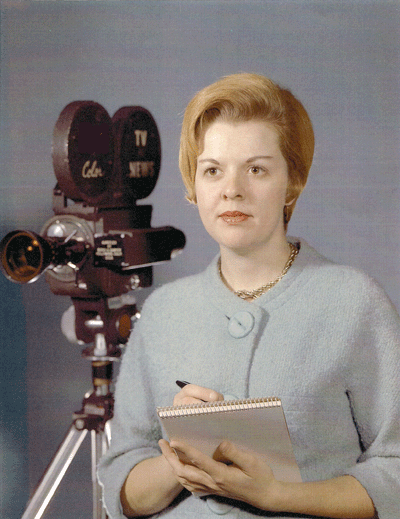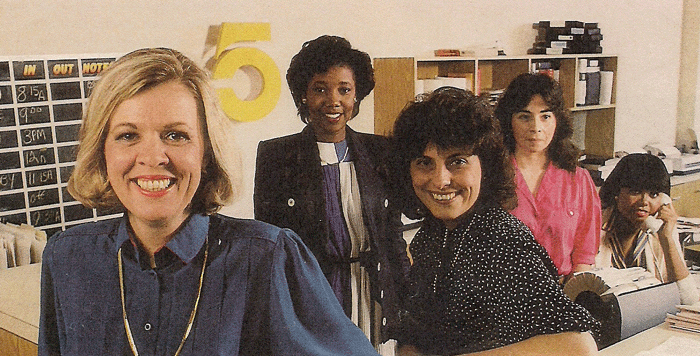
Betty
Wolden
Betty Wolden, Minnesota’s First
Betty Claire Wolden was born, May 2, 1941 in Minneapolis, Minnesota. Betty attended Central High School in Minneapolis and was active in a diverse number of areas: golf, cheerleading, mimes and mummers, and choir. It was in high school that her career choice started to become evident; she was chosen to be co-editor of the news staff when she was a junior, and as a senior: editor of the Central High News, the school’s student newspaper.
Betty enrolled at the University of Minnesota, but at the time she wasn’t absolutely sure what she wanted to do. “I knew that I didn’t want to be a teacher because that wasn’t me. And I couldn’t stand the sight of blood so I couldn’t be a nurse. And what else was there for a girl in 1959?”
Her college advisor was demanding a career choice though and so she decided to go into journalism. Journalism may not have been the best choice; a former television news producer and reporter, Raymond Voss wrote: “I remember a speech professor who insisted that only some men had voices deep and resonant enough to become announcers and on-air talent and that women, if they (women) were to be on-the-air, they should restrict their activities to ‘women’s topics’.”
In a Washington Post article about her just before she died, Betty said: “When I declared the major, a journalism professor said to me that I was wasting my time…because women don’t make it in the news business, and that all we came to college for was to get our MRS.”
Betty persisted though and graduated in the Spring of 1963. She then went looking for work. The St. Paul Pioneer Press Newspaper offered her an opportunity to work on the ‘women’s page’. When she protested that she wanted the police beat the editor ‘broke out in hysterical laughter…’ Even her request to write obituaries was denied because she was a ‘girl.’
So she wrote press releases for the St. Paul Mayor’s office. While serving in that position she discovered that the United Press International (UPI) news wire service was hiring and so she applied. She got the job. She worked from 4 AM to 1 PM every day, in what she described as “…about the worst section of town.” After two years, with no relief in sight, Betty quit UPI and went looking for work.
January 10, 1965, KSTP-TV in Minneapolis/St. Paul hired her. She became the first Twin Cities’ female television news reporter. “No training,” Betty said, “…nothing. I was on camera. I never got used to it.” Hers was perhaps the easiest entry into the local television newsroom of the 1960’s; other female hires were told what to wear or not wear, what stories to cover and where they could and could not go. Nancy Dickerson said in that Washington Post story, “Betty…has one fine sense of humor.” That was one attribute that garnered attention, but Betty was also smart, aware and creative. These were all qualities NBC wanted on their team. After about a year at KSTP, Betty Wolden left Minneapolis and St. Paul for the network’s Cleveland station. With her she carried the Distinguished Citizens Award from the mayor of Minneapolis, (the first time such an honor had been given to a reporter.) She also had the Outstanding Reporters Award from the Minneapolis Police Department, and recognition from the Associated Press Wire Service for a series of stories comparing food prices in the ‘ghetto’ with those serving high economic groups.Her stay in Cleveland lasted only as long as that in Minneapolis and St. Paul; in the autumn of 1967, Betty Wolden moved to Washington, D.C. and started working for WRC-TV as the second female reporter on staff. “I was twenty-six. I got here in time for the civil rights movements, the riots, the antiwar stuff…” She was there for the 1968 riots in D.C., the major Vietnam demonstration, and was a delegation correspondent at the Republican and Democratic national conventions in 1968.
Betty stayed at WRC and rose through the ranks. From reporter to producer to assignment editor to managing a special unit that produced news-series and special programs. In 1979 alone, the unit won seven Emmy’s. Betty was soon on the move again though; in January,1980 she moved to WDVM-TV, as the director of news; the first female news director in Washington and one of only three in the country. “I assumed that a woman…didn’t last too long as a reporter because you’re going to get old and get wrinkles…” Betty was quoted as saying, “so I went into the management end, taking…a big cut in salary. It was one of the smartest things I did….” Her stay at WDVM lasted about two years.
December of 1982, Betty was hired as the assignment manager for Metromedia’s national bureau. Four months later, in April of 1983, she was named the news director of WTTG. WTTG was not the best performing television news station in Washington, D.C.; Betty rebuilt the department: re-arranging, eliminating, adding. When she took over the department there were five reporters and three crews; when she was done revitalizing the department there were nine reporters, six commentators, eight news crews, two microwave trucks with engineers, and a staff of people of all backgrounds and ages. “It doesn’t have anything to do with EEO (Equal Employment Opportunity) – it’s because it’s right and because you have a better newscast if you have the divergence of opinion and thought.”

In Autumn of 1986, Betty Wolden was named the vice president and general manager of WTTG. In July of 1989, WTTG “experiences a substantial increase in ratings…as the number one station in Washington in the ratings competition.”
In an article in Regardie Magazine the author of an article on the ‘power elite’ wrote of Betty that she: “may be the most important reason behind WTTG’s rise to respectability and profitability.” The writer went on to say that no one challenged her because of her twenty years coming up through the ranks. He concluded by saying: “It was that track record that landed her last year’s (1986) Lifetime Achievement Award at the Washington Emmy’s.”
On August 19, 1989, Betty Wolden died of lung cancer at a Washington, D.C. hospital.
In the 1959 edition of the Central High School year book, the Centralian, under Betty Wolden, a comment read: “She had so many bright ideas, her hair turned red.” Her ideas changed the face of news in Washington, D.C. and her legacy is a five thousand dollar annual scholarship in her name that will yearly go to young journalists with fresh, new ideas, to continue what she began.
In 1984, the then former national president of American Women in Radio and Television, Jane Cohen wrote: “…those women who are the ‘firsts’ have a tremendous responsibility to stay and achieve and make damn sure there’s a second and a third and a fourth to follow.”
Betty Wolden did all that and more.
